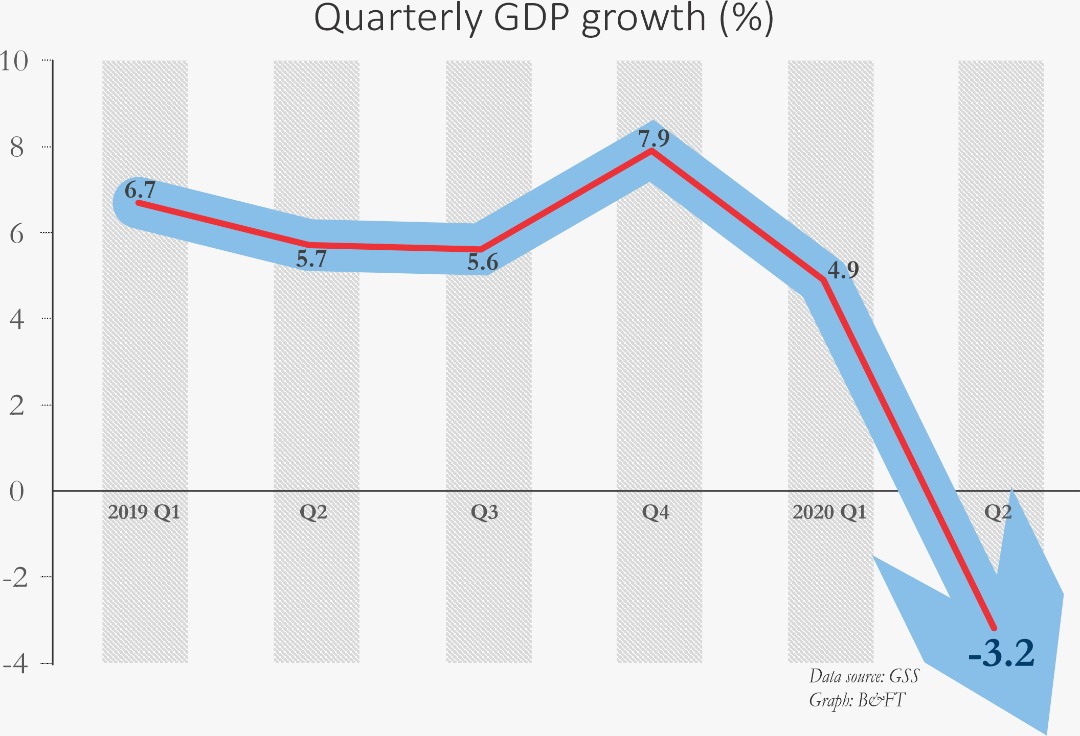- Hospitality sector shattered
The country’s economy in the second quarter of 2020 faced the full rigours of the coronavirus pandemic, as growth for the first time in about four decades contracted – largely occasioned by the hospitality sector’s abysmal performance.
Data from the Ghana Statistical Service (GSS) show that despite the information and communication sector growing at a phenomenal 74.2 percent, it wasn’t enough to save the economy – as it contracted by 3.2 percent compared to an impressive growth of 5.7 percent recorded in the same period a year ago.
In monetary value, goods and services produced in the second-quarter was worth some GH¢85.7billion. But when inflation is taken out, with 2013 as the base year, the economy’s worth in the period is GH¢38.6billion compared to GH¢39.9billion for the previous year.
The data clearly indicate that the hospitality sector, precisely hotels and restaurants, was hardest-impacted by the pandemic; and was further largely responsible for the economy’s contraction, as it also contracted by a horrifying 79.4 percent in the period under discussion.

It must be recalled that the hospitality industry was the sector that was most significantly affected by restrictions on movements and events as government implemented lockdown measures and ordered the closure of all drinking bars, night clubs, among others. The GSS data show sales revenue among accommodation and food businesses dropped as low as GH¢700,000 in April compared to GH¢2.5million for April 2019.
The hospitality sector was not the only one to experience this misfortune. The manufacturing sector also saw sales revenue slashed by almost half as it recorded GH¢25.6million in April compared to GH¢44.9million for the same period last year.
Restrictions on travel and trade also saw sales revenue from the sector drop to GH¢30.5million in April from GH¢45.5million in 2019 of same period.
In terms of real sectors of the economy, agriculture was the only one that experienced some growth, growing by 2.5 percent while industry and services contracted by 5.7 percent and 2.6 percent respectively.
Measures to mitigate pandemic’s impact
It is obvious from the second-quarter performance that the future looks grim for the economy. However, government has outlined a raft of measures to save the economy from going into recession. These include the COVID-19 Alleviation and Revitalisation Enterprises Support (CARES) programme, which is a GH¢100billion project to be carried out in two phases aimed at stimulating the economy.
First is the stabilisation phase, which aims at supporting enterprises’ recovery. This includes paying outstanding obligations to contractors and suppliers; injecting liquidity into the system and easing the cash-flow difficulties of businesses; developing another programme to support large business hard-hit by the pandemic; and also sourcing from the pharmaceuticals and textile & garment sectors, and expanding procurement from local producers for its goods and services.
Other interventions in the programme are: establishing a guarantee scheme of up to GH¢2billion so as to enable business borrow from banks at more affordable rates; increasing funding to the CAP-BuSS Programme being run by National Board for Small Scale Industries (NBSSI); and providing seed-funds for a retraining programme to help workers who are laid-off because of COVID-19 to develop new skills.
The second, which is the medium-term revitalisation phase, will also include initiatives such as supporting commercial farming by complementing the Planting for Food and Jobs and the Rearing for Food and Jobs programmes; providing targetted support to enable the private sector accelerate progress in building Ghana’s light manufacturing, technology, and digital economy sectors.
This phase will also make Ghana a regional financial hub by establishing an International Financial Services Centre (IFSC), as well as a regional manufacturing and logistics hub for the West Africa region; ensure a review of flagship programmes such as the 1D1F, Free SHS and water and sanitation; and enhance the private sector’s business environment through digitization, skills training, improvements in business regulations and their implementation, energy sector reform and expanding access to finance.










